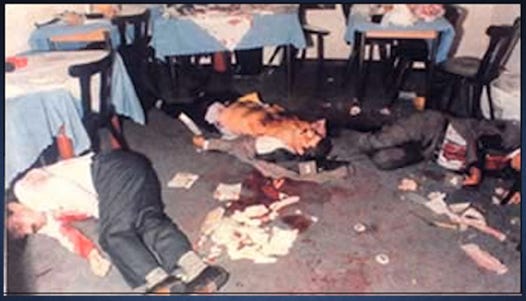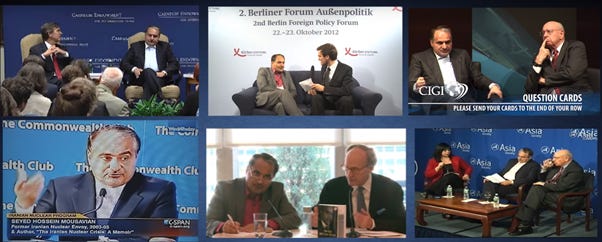A look back at the 1992 Mykonos assassinations
On September 17, 1992, senior Iranian-Kurdish opposition figures Sadegh Sharafkandi, Fattah Abdoli, Homayoun Ardalan, and their translator Nouri Dehkordi, were assassinated at the Mykonos Greek restaurant in Berlin, Germany.
Hossein Mousavian, currently “a Middle East Security and Nuclear Policy Specialist at the Program on Science and Global Security” at Princeton University, was Iran’s ambassador to Germany at the time. For decades now Iranian embassies and ambassadors have supervised and facilitated the regime’s foreign terrorism campaigns, including the assassination of Iranian dissidents stationed abroad.
Iranian ambassadors “were kept apprised of the operations and were instrumental in the post-kill whitewashing of the Islamic Republic. Mousavian was quite active on the German scene,” writes Reuel Marc Gerecht in the The Weekly Standard. “… he was the Iranian ambassador to Germany when Iranian agents machine-gunned Iranian-Kurdish dissidents at the Mykonos restaurant in Berlin in 1992. In the early 1990s, [former Iranian president Ali Akbar Hashemi] Rafsanjani and [current Iranian Supreme Leader Ali] Khamenei, then working in tandem, gave orders to Iranian intelligence to assassinate several annoying dissidents in Europe and Turkey.”
In April 1997 a German court ruled Iranian leaders and ministers, including Mousavian, were directly involved in the Mykonos restaurant assassination.
More from The Weekly Standard:
“We know that Iranian ambassadors, though most likely not players in the planning of these assassinations, were kept apprised of the operations and were instrumental in the post-kill whitewashing of the Islamic Republic. Mousavian was quite active on the German scene—he remained ambassador until 1997—denying Iranian culpability. In 1997 Tehran’s guilt was proven beyond a shadow of a doubt in a German court, and an arrest warrant was issued for the intelligence minister, Ali Fallahian. Fallahian’s men would not have moved without a green light from Khamenei and Rafsanjani.
“We can assume that the Central Intelligence Agency thoroughly debriefed Mousavian in exchange for his refuge. That’s fair game in power politics and espionage. (Why Princeton University—especially former ambassador Daniel Kurtzer, now at the Woodrow Wilson School, who strongly supported Mousavian’s appointment— would want to give a fellowship to someone who has so much blood swirling around him is a different question.)”
Ever since reaching the U.S., Mousavian has enjoyed a significant amount of attention and praise from certain circles and mainstream media outlets.
Iranian regime appeasement circles in the U.S. have welcomed Mousavian and recycled him as a “scholar” in Princeton University. These circles have organized conferences for Mousavian to voice Tehran’s views and how to befriend the mullahs. These circles also assist Mousavian in publishing articles in mainstream media, including Foreign Affairs, the BBC, the Guardian, Foreign Policy, the National Interest, the Atlantic Council, etc.
Obama’s White House, and former deputy national security advisor Ben Rhodes specifically, also had a close relationship with Mousavian. Rhodes pursued his “echo chamber” with Mousavian and others.
A 2016 report of “The White House’s Iran Treaty Echo Chamber” reads:
Princeton University – $70,000 “for support of Ambassador [Hossein] Mousavian’s analysis, publications and policymaker engagement on the range of elements involved with the negotiated settlement of Iran’s nuclear program.” Once it came under closer scrutiny, this grant in particular came under attack. Mousavian is not only a former Iranian ambassador, but also a spokesman for the Iranian nuclear effort. As James Phillips, senior research fellow for Middle Eastern affairs at the Heritage Foundation, observed, “This [grant by Ploughshares] essentially amounted to subsidizing Iran’s propaganda efforts in the United States.”
Obama’s White House established a close relationship with Mousavian during the course of the negotiations with Iran that led to the 2015 nuclear deal that provide Tehran, the world’s leading state sponsor of terrorism, with $152 billion in credit and cash.
A January 2017 scoop by Adam Kredo in the Washington Free Beacon sheds more light on this dangerous mingling.
Two high-level Iranian government backers, including a former Islamic Republic official and another accused of lobbying on Tehran's behalf, were hosted at the Obama White House for more than 30 meetings with top officials at key junctures in the former administration's contested diplomacy with Iran, according to White House visitor logs that provide a window into the former administration's outreach to leading pro-Iran advocates.
Seyed Mousavian, a former Iranian diplomat and head of its national security council, was hosted at the White House at least three times, while Trita Parsi, a pro-Iran advocate long accused of hiding his ties to the Iranian government, met with Obama administration officials some 33 times, according to recently updated visitor logs.
Sources familiar with the nature of the meetings told the Washington Free Beacon that both Parsi and Mousavian helped the White House craft its pro-Iran messaging and talking points that helped lead to the nuclear agreement with Iran. These efforts were part of a larger pro-Iran deal "echo chamber" led by senior Obama administration officials who were tasked with misleading Congress about the nature of the deal.
Mousavian, who also served as Iran's spokesperson during negotiations with the international community on the Iran deal, visited with White House National Security Council official Robert Malley, who advised the former president about the Middle East and the Islamic State terror group.
"In his writings and speeches [Mousavian] repeats the echo chamber talking points by shilling for the Iran deal, talking up fake Iranian moderation, and spinning conspiracy theories about Israelis and Arabs," the source added. "No wonder White House officials found time for him."
Mousavian is one of the main elements of Iran’s PR campaign and a senior member of Tehran’s network of apologists/lobbyists in the West. Here are a few names of this network.
For an in-depth look at Mousavian, I recommend watching this very informative video to the end.













